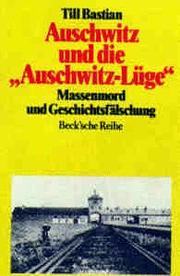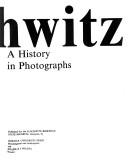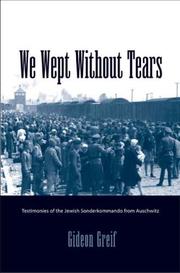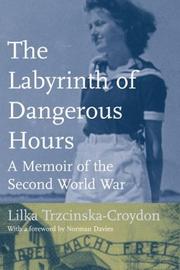| Listing 1 - 10 of 51 | << page >> |
Sort by
|
Book
ISBN: 3923946201 9783923946204 Year: 1991 Publisher: Bonn Borengässer
Abstract | Keywords | Export | Availability | Bookmark
 Loading...
Loading...Choose an application
- Reference Manager
- EndNote
- RefWorks (Direct export to RefWorks)
Holocaust (Christian theology) --- Holocaust, Jewish (1939-1945) --- Auschwitz (Concentration camp) --- KL Auschwitz --- Oświęcim (Concentration camp) --- Konzentrationslager Auschwitz --- Oshṿits (Concentration camp) --- Aušvic (Concentration camp) --- KZ Auschwitz --- Auschwitz I (Concentration camp) --- Concentration camp "Auschwitz" --- CC Auschwitz --- אוישוויץ --- אושוויץ --- אושוויץ (מחנה-ריכוז) --- מחנה אושווינצ׳ים --- Osvent︠s︡im (Concentration camp) --- Aushvit︠s︡ (Concentration camp) --- Освенцим (Concentration camp) --- Aousvits (Concentration camp) --- Аушвіц (Concentration camp)
Book
ISBN: 3838271068 9783838271064 3838211065 9783838211060 Year: 2018 Publisher: Stuttgart
Abstract | Keywords | Export | Availability | Bookmark
 Loading...
Loading...Choose an application
- Reference Manager
- EndNote
- RefWorks (Direct export to RefWorks)
Auschwitz (Concentration camp) --- KL Auschwitz --- Oświęcim (Concentration camp) --- Konzentrationslager Auschwitz --- Oshṿits (Concentration camp) --- Aušvic (Concentration camp) --- KZ Auschwitz --- Auschwitz I (Concentration camp) --- Concentration camp "Auschwitz" --- CC Auschwitz --- אוישוויץ --- אושוויץ --- אושוויץ (מחנה-ריכוז) --- מחנה אושווינצ׳ים --- Osvent︠s︡im (Concentration camp) --- Aushvit︠s︡ (Concentration camp) --- Освенцим (Concentration camp) --- Aousvits (Concentration camp) --- Аушвіц (Concentration camp)
Book
ISBN: 3110598213 3110593750 9783110598216 9783110593754 Year: 2019 Publisher: München Wien
Abstract | Keywords | Export | Availability | Bookmark
 Loading...
Loading...Choose an application
- Reference Manager
- EndNote
- RefWorks (Direct export to RefWorks)
This is the first attempt to explain how Jewish doctors survived extreme adversity in Auschwitz where death could occur at any moment. The ordinary Jewish slave labourer survived an average of fifteen weeks. Ross Halpin discovers that Jewish doctors survived an average of twenty months, many under the same horrendous conditions as ordinary prisoners. Despite their status as privileged prisoners Jewish doctors starved, froze, were beaten to death and executed. Many Holocaust survivors attest that luck, God and miracles were their saviors. The author suggests that surviving Auschwitz was far more complex. Interweaving the stories of Jewish doctors before and during the Holocaust Halpin develops a model that explains the anatomy of survival. According to his model the genesis of survival of extreme adversity is the will to live which must be accompanied by the necessities of life, specific personal traits and defence mechanisms. For survival all four must co-exist.
Auschwitz. --- jüdische Ärzte. --- Überleben. --- HISTORY / Holocaust. --- Auschwitz (Concentration camp) --- KL Auschwitz --- Oświęcim (Concentration camp) --- Konzentrationslager Auschwitz --- Oshṿits (Concentration camp) --- Aušvic (Concentration camp) --- KZ Auschwitz --- Auschwitz I (Concentration camp) --- Concentration camp "Auschwitz" --- CC Auschwitz --- אוישוויץ --- אושוויץ --- אושוויץ (מחנה-ריכוז) --- מחנה אושווינצ׳ים --- Osvent︠s︡im (Concentration camp) --- Aushvit︠s︡ (Concentration camp) --- Освенцим (Concentration camp) --- Aousvits (Concentration camp) --- Аушвіц (Concentration camp)
Book
ISBN: 389727146X Year: 2001 Publisher: Saarbrücken Pfau
Abstract | Keywords | Export | Availability | Bookmark
 Loading...
Loading...Choose an application
- Reference Manager
- EndNote
- RefWorks (Direct export to RefWorks)
Dessau, Paul, --- Nono, Luigi --- Weiss, Peter, --- Vais, Peter, --- Veĭs, Peter, --- Criticism and interpretation. --- Auschwitz (Concentration camp) --- KL Auschwitz --- Oświęcim (Concentration camp) --- Konzentrationslager Auschwitz --- Oshṿits (Concentration camp) --- Aušvic (Concentration camp) --- KZ Auschwitz --- Auschwitz I (Concentration camp) --- Concentration camp "Auschwitz" --- CC Auschwitz --- אוישוויץ --- אושוויץ --- אושוויץ (מחנה-ריכוז) --- מחנה אושווינצ׳ים --- Osvent︠s︡im (Concentration camp) --- Aushvit︠s︡ (Concentration camp) --- Освенцим (Concentration camp) --- Aousvits (Concentration camp) --- Аушвіц (Concentration camp)

ISBN: 3406374484 Year: 1995 Publisher: München Verlag C.H. Beck
Abstract | Keywords | Export | Availability | Bookmark
 Loading...
Loading...Choose an application
- Reference Manager
- EndNote
- RefWorks (Direct export to RefWorks)
Holocaust denial --- Holocaust, Jewish (1939-1945) --- Holocaust revisionism --- Revisionism, Holocaust --- Denialism --- Errors, inventions, etc. --- Auschwitz (Concentration camp) --- KL Auschwitz --- Oświęcim (Concentration camp) --- Konzentrationslager Auschwitz --- Oshṿits (Concentration camp) --- Aušvic (Concentration camp) --- KZ Auschwitz --- Auschwitz I (Concentration camp) --- Concentration camp "Auschwitz" --- CC Auschwitz --- אוישוויץ --- אושוויץ --- אושוויץ (מחנה-ריכוז) --- מחנה אושווינצ׳ים --- Osvent︠s︡im (Concentration camp) --- Aushvit︠s︡ (Concentration camp) --- Auschwitz (Poland: Concentration camp) --- Освенцим (Concentration camp) --- Aousvits (Concentration camp) --- Аушвіц (Concentration camp)

ISBN: 8305126439 Year: 1993 Publisher: Oświecim Auschwitz-Birkenau state museum
Abstract | Keywords | Export | Availability | Bookmark
 Loading...
Loading...Choose an application
- Reference Manager
- EndNote
- RefWorks (Direct export to RefWorks)
Holocaust, Jewish (1939-1945) --- Pictorial works. --- Pictorial works --- Auschwitz (Concentration camp) --- KL Auschwitz --- Oświęcim (Concentration camp) --- Konzentrationslager Auschwitz --- Oshṿits (Concentration camp) --- Aušvic (Concentration camp) --- KZ Auschwitz --- Auschwitz I (Concentration camp) --- Concentration camp "Auschwitz" --- CC Auschwitz --- אוישוויץ --- אושוויץ --- אושוויץ (מחנה-ריכוז) --- מחנה אושווינצ׳ים --- Osvent︠s︡im (Concentration camp) --- Aushvit︠s︡ (Concentration camp) --- Освенцим (Concentration camp) --- Aousvits (Concentration camp) --- Аушвіц (Concentration camp)
Book
Abstract | Keywords | Export | Availability | Bookmark
 Loading...
Loading...Choose an application
- Reference Manager
- EndNote
- RefWorks (Direct export to RefWorks)
Guerre mondiale, 1939-1945 --- Musiciens --- Fénelon, Fania --- Holocaust, Jewish (1939-1945) --- Musicians --- 343.819.5 <430> --- Personal narratives --- Biography --- Fénelon, Fania. --- Auschwitz (Concentration camp) --- KL Auschwitz --- Oświęcim (Concentration camp) --- Konzentrationslager Auschwitz --- Oshṿits (Concentration camp) --- Aušvic (Concentration camp) --- KZ Auschwitz --- Auschwitz I (Concentration camp) --- Concentration camp "Auschwitz" --- CC Auschwitz --- אוישוויץ --- אושוויץ --- אושוויץ (מחנה-ריכוז) --- מחנה אושווינצ׳ים --- Osvent︠s︡im (Concentration camp) --- Aushvit︠s︡ (Concentration camp) --- 78.29.1 --- Освенцим (Concentration camp) --- Aousvits (Concentration camp) --- Аушвіц (Concentration camp)
Book
ISBN: 0810136090 0810136082 0810136104 Year: 2018 Publisher: Evanston, Illinois : Northwestern University Press,
Abstract | Keywords | Export | Availability | Bookmark
 Loading...
Loading...Choose an application
- Reference Manager
- EndNote
- RefWorks (Direct export to RefWorks)
This book about the early screen representation of Auschwitz-Birkenau deals with the classic Holocaust film made in 1948 in Poland by Auschwitz survivor, director Wanda Jakubowska. The Last Stage (or The Last Stop) is a pioneering work - the first narrative film to portray the former Nazi German camp. Haltof discusses Jakubowska's life and career before World War II, her imprisonment during the war, the prominent role that she played in the nationalized postwar Polish cinema, and problems she faced during the script stage. The monograph also discusses the unusual circumstances that surrounded the production of the film at Auschwitz-Birkenau and summarizes critical debates surrounding its release. Screening Auschwitz is the first detailed monograph on this classic Holocaust film. The book incorporates new materials and sources obtained through extensive archival research, and examines the impact of the film on other Holocaust narratives.
Holocaust, Jewish (1939-1945), in motion pictures. --- Jakubowska, Wanda, --- Criticism and interpretation. --- Auschwitz (Concentration camp) --- In motion pictures. --- Ostatni etap (Motion picture) --- Motion pictures --- Last Stage (Motion picture) --- KL Auschwitz --- Oświęcim (Concentration camp) --- Konzentrationslager Auschwitz --- Oshṿits (Concentration camp) --- Aušvic (Concentration camp) --- KZ Auschwitz --- Auschwitz I (Concentration camp) --- Concentration camp "Auschwitz" --- CC Auschwitz --- אוישוויץ --- אושוויץ --- אושוויץ (מחנה-ריכוז) --- מחנה אושווינצ׳ים --- Osvent︠s︡im (Concentration camp) --- Aushvit︠s︡ (Concentration camp) --- Освенцим (Concentration camp) --- Aousvits (Concentration camp) --- Аушвіц (Concentration camp)

ISBN: 1281722804 9786611722807 0300131984 9780300131987 0300106513 9780300106510 9780300211979 030021197X 9781281722805 6611722807 Year: 2005 Publisher: New Haven, Conn. London Yale University Press
Abstract | Keywords | Export | Availability | Bookmark
 Loading...
Loading...Choose an application
- Reference Manager
- EndNote
- RefWorks (Direct export to RefWorks)
The Sonderkommando of Auschwitz-Birkenau consisted primarily of Jewish prisoners forced by the Germans to facilitate the mass extermination. Though never involved in the killing itself, they were compelled to be "members of staff" of the Nazi death-factory. This book, translated for the first time into English from its original Hebrew, consists of interviews with the very few surviving men who witnessed at first hand the unparalleled horror of the Auschwitz-Birkenau death camp. Some of these men had never spoken of their experiences before. Over a period of years, Gideon Greif interviewed intensively all Sonderkommando survivors living in Israel. They describe not only the details of the German-Nazi killing program but also the moral and human challenges they faced. The book provides direct testimony about the "Final Solution of the Jewish Problem," but it is also a unique document on the boundless cruelty and deceit practiced by the Germans. It documents the helplessness and powerlessness of the one-and-a-half million people, 90 percent of them Jews, who were brutally murdered in the gas chambers of Auschwitz-Birkenau.
Holocaust, Jewish (1939-1945) --- Sonderkommandos --- Concentration camp inmates --- Auschwitz (Concentration camp) --- KL Auschwitz --- Oświęcim (Concentration camp) --- Konzentrationslager Auschwitz --- Oshṿits (Concentration camp) --- Aušvic (Concentration camp) --- KZ Auschwitz --- Auschwitz I (Concentration camp) --- Concentration camp "Auschwitz" --- CC Auschwitz --- אוישוויץ --- אושוויץ --- אושוויץ (מחנה-ריכוז) --- מחנה אושווינצ׳ים --- Osvent︠s︡im (Concentration camp) --- Aushvit︠s︡ (Concentration camp) --- Nazi concentration camp inmates --- Освенцим (Concentration camp) --- Aousvits (Concentration camp) --- Аушвіц (Concentration camp)

ISBN: 1282029258 9786612029257 1442681586 9781442681583 0802039588 9780802039583 1487530110 Year: 2004 Publisher: Toronto
Abstract | Keywords | Export | Availability | Bookmark
 Loading...
Loading...Choose an application
- Reference Manager
- EndNote
- RefWorks (Direct export to RefWorks)
"Lilka Trzcinska was fourteen years old when the Nazis invaded Poland in 1939. The daughter of an architect, Lilka was a high school student at the time. When schools were closed by the occupier, she, along with her siblings, continued their education in secret classes and joined the Polish Home Army - the secret resistance force." "Lilka and her family were arrested by the Gestapo in 1943 and sent to the political prison Pawiak, then to Auschwitz. There, Lilka's mother died, and her younger sister was sent off to another camp. The rest of the family was put to work in the camp building offices. After being transported to a number of other camps (in one instance by way of a three-day march), the three sisters were reunited in 1945, and shortly thereafter liberated by the British. Lilka later went to Italy to coninue her education, moving to Canada in 1948." "The Labyrinth of Dangerous Hours is the memoir of a survivor. Lilka Trzcinska-Croydon narrates her adolescence and that of her sisters and brother in a way than binds poetry and history together seamlessly. It describes the strength of the family ties and solidarity that helped them emerge from their horrific ordeal with their dignity intact."--Jacket.
World War, 1939-1945 --- Prisoners and prisons, German. --- Underground movements --- Trzcinska-Croydon, Lilka. --- Croydon, Lilka Trzcinska --- -Trzcinska, Helena --- Croydon, Lilka --- Auschwitz (Concentration camp) --- KL Auschwitz --- Oświęcim (Concentration camp) --- Konzentrationslager Auschwitz --- Oshṿits (Concentration camp) --- Aušvic (Concentration camp) --- KZ Auschwitz --- Auschwitz I (Concentration camp) --- Concentration camp "Auschwitz" --- CC Auschwitz --- אוישוויץ --- אושוויץ --- אושוויץ (מחנה-ריכוז) --- מחנה אושווינצ׳ים --- Osvent︠s︡im (Concentration camp) --- Aushvit︠s︡ (Concentration camp) --- Освенцим (Concentration camp) --- Aousvits (Concentration camp) --- Аушвіц (Concentration camp) --- Poland --- History
| Listing 1 - 10 of 51 | << page >> |
Sort by
|

 Search
Search Feedback
Feedback About UniCat
About UniCat  Help
Help News
News